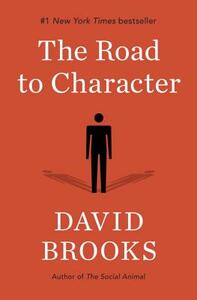Take a photo of a barcode or cover
I believe that David Brooks is on to something in regards to our lack of deep attention to moral development in our current culture. His approach draws from the lives of a cross section of thinkers, leaders, and parents weaving a tapestry of a moral and a meaningful life.
Some of the biographies were interesting, but several parts were dull. His style could be better and at times it becomes very preachy but that does not detract from his argument. And I think I read this book at just the right time of my life.
I am inspired to find my true vocation and fulfill it to the best of my abilities.
Some of the biographies were interesting, but several parts were dull. His style could be better and at times it becomes very preachy but that does not detract from his argument. And I think I read this book at just the right time of my life.
I am inspired to find my true vocation and fulfill it to the best of my abilities.
informative
inspiring
reflective
medium-paced
it is a teensy weensy bit retrospective in nature but it provides better advice than what i can find on reddit so ill take it
The premise of the book gets five stars. David Brooks talks about how there are two types of people. One externally driven by ambition, career, etc (called the "resume virtues"). The other is more internally driven (called "eulogy virtues"). He talks about how the externally-driven self usually overshadows the internally-driven but ultimately will not provide the deep satisfaction people usually look for. Brooks then picks eight characteristics that he thinks will help develop the "eulogy virtues". In each chapter he picks someone in history to personify that trait.
I completely agree with the premise. However overall I found the book to be poorly organized and too long. First, there is no explanation as to why those eight characteristics were chosen. I am not convinced that it is an exhaustive list or even the most important eight. Second, each chapter seemed to drag on with the biography of the person before really getting to the point. It was a real slog for me to get through this book.
I almost wished I did what he said in the intro and just skipped to the last chapter because it provided a summary that was good enough to get a basic understanding of the whole book.
I completely agree with the premise. However overall I found the book to be poorly organized and too long. First, there is no explanation as to why those eight characteristics were chosen. I am not convinced that it is an exhaustive list or even the most important eight. Second, each chapter seemed to drag on with the biography of the person before really getting to the point. It was a real slog for me to get through this book.
I almost wished I did what he said in the intro and just skipped to the last chapter because it provided a summary that was good enough to get a basic understanding of the whole book.
a great, only subtly religious, introduction to the moral cosmology of Christianity. what it lacks and needs is a clearer source of morality than presupposing intrinsic agreement
I'm pretty torn on this book. I liked the historical examples, but I kind of feel like this book was trying too hard. Self centeredness got mashed in with selfies and snapchat. I will admit Brooks attempted to skirt around actively calling out Millennial, and he did bring up that the past wasn't perfect, with racism, sexism and all the other things, but it still felt bashing of todays culture.
Maybe it's just that I'm not in the mainstream (goodreads is my social media, as an illustration), but I'm not sure how I feel about what he said. Maybe I need to sit with it a while longer.
Honestly, I think it's a good conversation starter, and would encourage other people to read it, but don't necessarily think that it should be put into practice.
Maybe it's just that I'm not in the mainstream (goodreads is my social media, as an illustration), but I'm not sure how I feel about what he said. Maybe I need to sit with it a while longer.
Honestly, I think it's a good conversation starter, and would encourage other people to read it, but don't necessarily think that it should be put into practice.
According to NYT columnist David Brooks, the West has eschewed a culture of moral realism and has adopted a moral ecology based on the self, the "Big Me." While this shift was necessary and helpful for many, it has gone too far. The "self-esteem movement," self-help books, and technology has created a Dr. Seuss-ified culture: "You have brains in your head. You have feet in your shoes. You can steer yourself any direction you choose." Our culture values résumé accolades rather than eulogy virtues. We have dropped words like "courage," "bravery," "kindness," "character," and "sin" with self-centered phrases like "I can do it!"
Each chapter of The Road to Character, is a biographical snapshot of a figure that Brooks believes cultivated character: Frances Perkins ("The Summoned Self"), Dwight D. Eisenhower ("Self-Conquest"), Dorothy Day ("Struggle"), George Marshall ("Self-Mastery"), A. Philip Randolph and Bayard Rustin ("Dignity"), George Eliot ("Love"), St. Augustine ("Ordered Love") and Samuel Johnson ("Self-Examination"). The payoff is the final chapter ("The Big Me") in which Brooks draws all of these together.
Brooks' skill is in the short form. Both The Social Animal and The Road to Character are interesting and informative, but they lack the precision of his NYT column. Some of the biographical snapshots are incredibly fascinating (I particularly enjoyed the chapter on Dorothy Day) but others were quite a challenge to get through (George Eliot and Samuel Johnson). Overall, this a good read that will leave you with a lot to think about.
Each chapter of The Road to Character, is a biographical snapshot of a figure that Brooks believes cultivated character: Frances Perkins ("The Summoned Self"), Dwight D. Eisenhower ("Self-Conquest"), Dorothy Day ("Struggle"), George Marshall ("Self-Mastery"), A. Philip Randolph and Bayard Rustin ("Dignity"), George Eliot ("Love"), St. Augustine ("Ordered Love") and Samuel Johnson ("Self-Examination"). The payoff is the final chapter ("The Big Me") in which Brooks draws all of these together.
Brooks' skill is in the short form. Both The Social Animal and The Road to Character are interesting and informative, but they lack the precision of his NYT column. Some of the biographical snapshots are incredibly fascinating (I particularly enjoyed the chapter on Dorothy Day) but others were quite a challenge to get through (George Eliot and Samuel Johnson). Overall, this a good read that will leave you with a lot to think about.
Good discussion of how society has changed in terms of not valuing character. While it is not specifically a religious book, it does highlight the lives of different individuals from history who are not perfect individuals but who became better people because of their struggles.
hopeful
informative
fast-paced
This book has a unique structure. It doesn’t read like a self help book, though it might be categorized as such. Personal development is more accurate. Some might say that small distinction is just semantics, but it truly seems so different from a self help book to me. It’s not instructive. The fact that each chapter covers a different person is so compelling. You get a mini biography of that person. Even though it’s condensed, it covers the meat of what I would want out of a full biography anyways: an insight into their character, their greatness, their struggles, and how they became the person they are. When you isolate the chapters, it feels like it could be a novel, or a history or philosophy book. What really drew me into the book is that it spoke to my soul. It came at a time when my thoughts were swirling about ambition.


